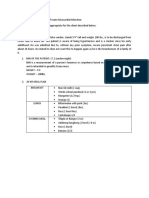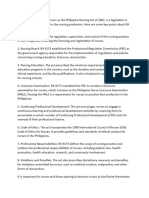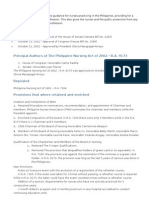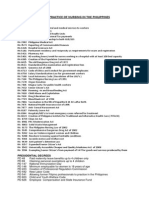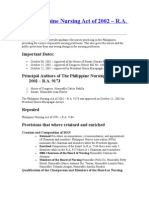Describe How The Philippine Nursing Law Evolve Through Time
Uploaded by
lyka resurreccionDescribe How The Philippine Nursing Law Evolve Through Time
Uploaded by
lyka resurreccionNCM 107
RESURRECCION, CRYSTAL JADE S.
Unit task:
1. Describe how the Philippine nursing law evolve through time.
- Today, the nursing profession has changed drastically. There are more training
programs, better hospitals, more responsibility, a sense of family, and a focus on patient
care in the nursing industry that has saved lives and created generations of dedicated
medical professionals. Today, nurses must acquire their degrees through a combination
of competency-based and community-oriented courses. The Philippine curriculum has
several advantages compared with those of other Asia Pacific Economic Cooperation
(APEC) institutions. This kind of education offers much more than a solely skill-based
curriculum can. The four-year requirement to earn a bachelor's degree in nursing meets
the minimum entry requirement for professional nursing practice.
2. Compare and Contrast Ra 9173 and RA 7164
- RA 9173 This act states that the nursing education program should provide general and
professional foundation for the practice of nursing. It also states that all the learning
experiences should follow the regulations and requirements set by Commission on
Higher Education (CHEd) for nursing education.
- RA 7164 This act states that the nursing education should provide sound academic and
professional foundation for the practice of nursing. It did not state the specific
department that should provide policies needed to be used as guide for nursing
education in the Philippines.
- R.A. 7164 as compared to that of R.A. 9173 did not specify the commission on which all
the regulations and requirements can be found. Whereas, RA 9173 specified the CHEd
as the sole provider of the rules and regulations about nursing education. There is also a
significant change on the number of years one should have in the clinical practice, and
the holding of a master’s degree for those wishing to be dean of a university.
You might also like
- Comparison and Analysis of Ra 9173 & Ra 7164100% (4)Comparison and Analysis of Ra 9173 & Ra 71648 pages
- Program - The Nursing Education Nursing-A Person: DE JESUS, Flor Anne D. BSN 112/ Group 46No ratings yetProgram - The Nursing Education Nursing-A Person: DE JESUS, Flor Anne D. BSN 112/ Group 4616 pages
- Principal Authors of The Philippine Nursing Act of 2002 - R.A. 9173No ratings yetPrincipal Authors of The Philippine Nursing Act of 2002 - R.A. 91737 pages
- Laws Affecting The Practice of Nursing in The Philippines100% (1)Laws Affecting The Practice of Nursing in The Philippines6 pages
- The Emense Power of The Philippine Nursing LawNo ratings yetThe Emense Power of The Philippine Nursing Law8 pages
- Unp-Cn Do Not Reproduce: University of Northern PhilippinesNo ratings yetUnp-Cn Do Not Reproduce: University of Northern Philippines5 pages
- A Handbook for Student Nurses, 2015–16 edition: Introducing Key Issues Relevant to PracticeFrom EverandA Handbook for Student Nurses, 2015–16 edition: Introducing Key Issues Relevant to Practice5/5 (2)
- RA 9173 The Philippine Nursing Act of 2002: It Shall Be The Duty of The Nurse To PEPUTNo ratings yetRA 9173 The Philippine Nursing Act of 2002: It Shall Be The Duty of The Nurse To PEPUT7 pages
- FAYLOGA - John Mheldrick R.-BSN-II-VII-MARILYN-RAY-ASSIGNMENT-LAWS-AFFECTING-CHN-I-NURSING-PROFESSIONNo ratings yetFAYLOGA - John Mheldrick R.-BSN-II-VII-MARILYN-RAY-ASSIGNMENT-LAWS-AFFECTING-CHN-I-NURSING-PROFESSION6 pages
- Evaluation of a Dialogical Psychologically Informed Environment (PIE) Pilot: Addressing homelessness, re-offending, substance abuse, and mental illnessFrom EverandEvaluation of a Dialogical Psychologically Informed Environment (PIE) Pilot: Addressing homelessness, re-offending, substance abuse, and mental illnessNo ratings yet
- A Guide to Medical Teaching and Learning Training of the Trainers (Tot): In the View of the Learner-Centered Learning ModelFrom EverandA Guide to Medical Teaching and Learning Training of the Trainers (Tot): In the View of the Learner-Centered Learning ModelNo ratings yet
- How to Thrive as a Newly Registered Nurse, second editionFrom EverandHow to Thrive as a Newly Registered Nurse, second editionNo ratings yet
- A Handbook for Student Nurses, 201617 edition: Introducing key issues relevant for practiceFrom EverandA Handbook for Student Nurses, 201617 edition: Introducing key issues relevant for practice4/5 (1)
- MENSTRUATION: Monthly Discharge of Blood From The Uterus Occurring Form Puberty To MenopauseNo ratings yetMENSTRUATION: Monthly Discharge of Blood From The Uterus Occurring Form Puberty To Menopause18 pages
- Predisposing Factor Precipitating FactorNo ratings yetPredisposing Factor Precipitating Factor1 page
- Needs Wants and Demands: Marketing ConceptNo ratings yetNeeds Wants and Demands: Marketing Concept4 pages
- Short Case Analysis: Answer The Questions in 5-10sentences Only. Do Not Forget To Cite Your Reference(s) To Support/justify Your AnswerNo ratings yetShort Case Analysis: Answer The Questions in 5-10sentences Only. Do Not Forget To Cite Your Reference(s) To Support/justify Your Answer1 page
- Osteoarthritis (Degenerative Joint Disease) : Prepared By: Gary Jaimes Bu StamanteNo ratings yetOsteoarthritis (Degenerative Joint Disease) : Prepared By: Gary Jaimes Bu Stamante28 pages



